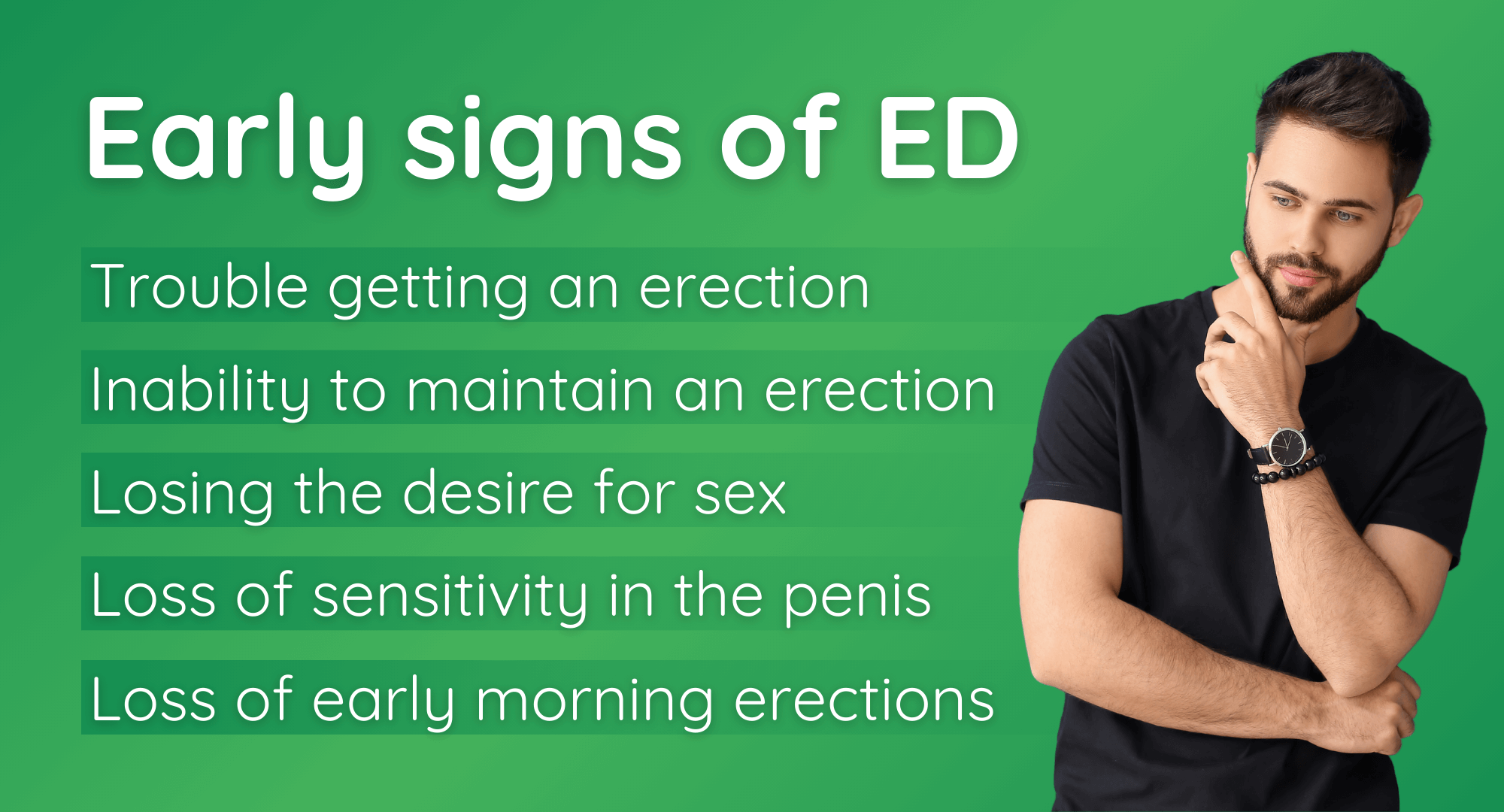Helping Your Partner With Erectile Dysfunction (ED)
Table of Contents
Erectile Dysfunction (ED) is a common condition that affects millions of men worldwide, causing significant stress and strain in relationships. It occurs when a man has difficulty achieving or maintaining an erection sufficient for sexual activity. While ED can be a sensitive and challenging issue, it’s important to remember that it is a treatable condition, and support from a loving partner can make a significant difference in managing it.
In this blog, we will explore practical ways to support your partner through the challenges of ED. From understanding the causes and treatments to providing emotional support and fostering open communication, this guide aims to equip you with the knowledge and tools to navigate this journey together. Whether you’re in a long-term relationship or just starting out, learning how to support your partner can strengthen your bond and improve your intimacy and overall relationship satisfaction.
Join us as we delve into strategies and tips for helping your partner with ED, promoting a healthy and fulfilling relationship despite the challenges that may arise.
Learn as much as you can about ED
This condition can be influenced by a combination of physical and psychological factors.
Physical causes
Physical causes of ED are often related to underlying health issues that affect blood flow or nerve function. Common physical causes include:
- Cardiovascular diseases: Conditions like heart disease and atherosclerosis (clogged blood vessels) reduce blood flow to the penis.
- Diabetes: High blood sugar levels can damage nerves and blood vessels, contributing to ED.
- Obesity: Excess weight can lead to cardiovascular disease and diabetes, which are risk factors for ED.
- High blood pressure and cholesterol: These conditions can damage blood vessels, impacting blood flow to the penis.
- Hormonal imbalances: Low testosterone levels can affect sexual function.
- Medications: Drugs for depression, high blood pressure, and other conditions can have side effects that include ED.
Psychological causes
The psychological factors contributing to ED include:
- Mental health issues: Stress, anxiety, and depression can significantly impact sexual desire and performance.
- Relationship problems: Issues such as poor communication, stress, and conflicts with a partner can trigger or exacerbate ED.
Treatment options
Effective management of ED often involves addressing the underlying cause:
- Lifestyle changes: Improving diet, increasing physical activity, quitting smoking, and reducing alcohol consumption can help.
- Medications: PDE5 inhibitors like sildenafil (Viagra), tadalafil (Cialis), and vardenafil (Levitra) are commonly prescribed.
- Therapy: Counselling or sex therapy can be beneficial, especially when psychological factors are involved.
- Medical devices: Options like vacuum erection devices and penile implants are available for those who do not respond to other treatments.
Understanding ED involves recognising its multifaceted nature and exploring various treatment avenues to find the most effective solution.

Let them know how much you value them
Expressing how much you value your partner is essential, especially when they are dealing with a sensitive issue like Erectile Dysfunction (ED). Open communication is the cornerstone of a supportive relationship. Let your partner know that their worth goes far beyond their physical performance. Emphasize the qualities you appreciate in them, such as their kindness, sense of humour, intelligence, and the emotional support they provide. By reinforcing these positive attributes, you help build their self-esteem, which can be significantly impacted by ED.
Moreover, showing empathy and understanding is crucial. Acknowledge the emotional and psychological struggles they may be facing and assure them that you are in this together. Encourage them to seek medical advice and offer to accompany them to doctor’s appointments if they feel comfortable with it. This not only shows your support but also emphasizes that you view ED as a shared challenge rather than an individual problem. By fostering an environment of mutual support and compassion, you can strengthen your relationship and help your partner feel valued and understood.
Talk about how you feel
When dealing with Erectile Dysfunction (ED) in a relationship, it’s important to communicate your feelings openly and honestly with your partner. Sharing how you feel can help alleviate the stress and anxiety that often accompany this condition. Start by expressing your empathy and understanding. Let your partner know that you recognize the emotional and physical challenges they are facing and that you are there to support them through this difficult time.
Additionally, share your own feelings about the situation. It’s okay to admit that you might be feeling worried, frustrated, or even insecure. By being vulnerable, you can foster a deeper connection and mutual understanding. Reassure your partner that your feelings for them go beyond their sexual performance and that you value the emotional and relational aspects of your relationship just as much. This can help reduce any feelings of inadequacy or shame they might be experiencing and reinforce the idea that you are a team, facing this challenge together.
Stay positive
Maintaining a positive outlook is crucial when navigating Erectile Dysfunction (ED) in a relationship. Positivity can significantly impact both partners’ emotional well-being and create a supportive environment that fosters intimacy and connection. Remind your partner—and yourself—that ED is a common and treatable condition. Many couples face this challenge and come out stronger on the other side. Emphasize the proactive steps you both are taking to address the issue, whether it’s seeking medical treatment, making lifestyle changes, or attending therapy sessions.
Focus on the aspects of your relationship that bring joy and satisfaction. Plan activities that you both enjoy and that strengthen your bond outside of the bedroom. Celebrate small victories and progress, no matter how minor they may seem. This positive reinforcement can boost your partner’s confidence and help alleviate the pressure associated with ED. By maintaining a hopeful and optimistic perspective, you create a nurturing atmosphere where your partner feels valued and supported, which can significantly contribute to overcoming the challenges of ED together.

Adjust your sex life
Adapting your sex life to accommodate Erectile Dysfunction (ED) involves exploring new ways to maintain intimacy and satisfaction in your relationship. Open communication is essential. Discuss with your partner what feels good, what doesn’t, and any concerns or desires you both have. This can help reduce anxiety and build a deeper emotional connection, fostering a more relaxed and enjoyable sexual experience.
Consider incorporating different forms of intimacy and sexual activity that do not solely rely on penetration. This can include mutual masturbation, oral sex, or using sex toys. These alternatives can reduce the pressure to perform and allow both partners to experience pleasure and closeness in new ways. Additionally, focusing on foreplay and extending it can enhance arousal and intimacy, making the experience more fulfilling for both partners. Remember that intimacy is not just about sex; spending quality time together, engaging in non-sexual physical touch, and expressing affection can strengthen your bond and reduce the stress associated with ED.
Experimenting with different sexual positions can also be beneficial. Some positions may be more comfortable or more conducive to maintaining an erection than others. Consulting with our pharmacist or a sex therapist can provide personalised strategies and recommendations to help adjust your sex life effectively. By being open, patient, and willing to explore, you can maintain a satisfying and intimate relationship despite the challenges posed by ED.
Offer to go with them to the doctor
Supporting your partner by offering to accompany them to the doctor can significantly ease their anxiety and demonstrate your commitment to facing Erectile Dysfunction (ED) together. Many men find discussing ED with our pharmacist uncomfortable, but your presence can provide emotional support and encouragement. It shows that you are invested in their well-being and are willing to take active steps to address the issue as a team.
During medical appointments, you can help by asking questions, taking notes, and ensuring that all concerns are addressed. This collaborative approach can make the experience less daunting for your partner and ensure that important information is not overlooked. Additionally, being present allows you to understand the medical advice and treatment options better, enabling you to offer more informed support at home. By actively participating in the medical journey, you reinforce your partnership and help create a supportive environment conducive to managing and overcoming ED.
Remind them to let their doctor know how they’re doing
Encourage your partner to keep their doctor informed about their progress and any changes they experience while managing Erectile Dysfunction (ED). Regular updates can help the pharmacist adjust treatment plans as needed and ensure that the approach remains effective. It’s important for our pharmacist to be aware of any side effects from medications, improvements or worsening of symptoms, and overall satisfaction with the treatment.
Suggest that your partner prepare for each appointment by noting down any concerns or observations since their last visit. This could include changes in erectile function, emotional well-being, or any lifestyle adjustments they’ve made. Being proactive in communicating with their doctor can lead to more personalised and effective care. Additionally, maintaining an open dialogue with their pharmacist, can help identify any new or underlying health issues that might be affecting their ED. By staying engaged in their treatment process, your partner can achieve better outcomes and feel more supported in managing their condition.
Keep up the other intimate parts of your relationship
Maintaining intimacy in a relationship affected by Erectile Dysfunction (ED) involves focusing on the emotional and physical connections beyond sexual activity. Start by prioritising quality time together. Engage in activities that you both enjoy, whether it’s going for walks, cooking together, or watching a favourite movie. These shared experiences can strengthen your bond and reinforce the emotional closeness that is vital for a healthy relationship.
Physical touch plays a crucial role in maintaining intimacy. Regularly hugging, holding hands, and cuddling can help maintain a sense of closeness and affection. These non-sexual physical interactions can reduce stress and anxiety, which are often associated with ED, and remind both partners of their emotional and physical connection. Additionally, verbal affirmations and expressing love and appreciation for each other can deepen your emotional intimacy. By focusing on these aspects of your relationship, you can foster a supportive and loving environment that helps both partners feel valued and connected despite the challenges of ED.

